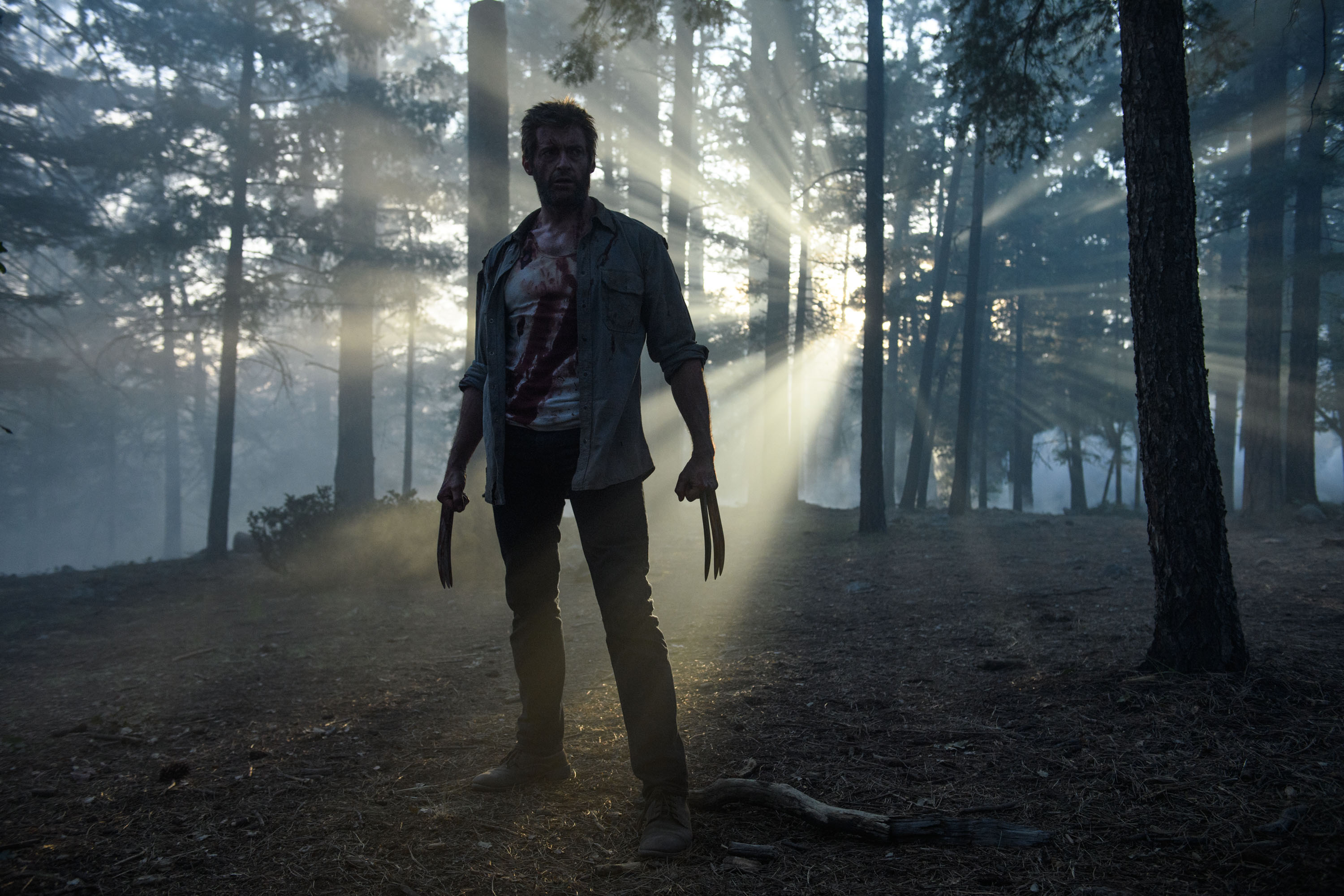17 years as Wolverine: Hugh Jackman's superheroic version of Boyhood
His new film Logan caps a remarkable display of longevity


A free daily email with the biggest news stories of the day – and the best features from TheWeek.com
You are now subscribed
Your newsletter sign-up was successful
With the release of Logan today, Hugh Jackman enters rarified air: The actor has now played Wolverine for almost 17 years.
When the first X-Men came out back in July 2000, George W. Bush was still six months away from assuming the presidency, and Sept. 11 was still a meaningless date. But now, nearly two decades and nine movies later, we've finally reached the end of Jackman's tenure as the Marvel Comics superhero with a metal-coated skeleton and retractable claws.
It's a remarkable display of longevity matched only by the likes of soap operas, Dr. Frasier Crane, animation, and a handful of stalwarts on decades-spanning shows like Law & Order. Indeed, few contemporary film actors can boast anything similar. When the sixth Mission: Impossible movie comes out next summer, Tom Cruise will celebrate 22 years as Ethan Hunt, and next month's eighth Fast and Furious movie arrives almost 16 years after Vin Diesel first got behind the wheel as Dominic Toretto. But apart from turning up somewhat less regularly than Wolverine, Hunt and Toretto are defined more by their unchanging archetypal consistency than their evolution. They can get disavowed, or team up with proper law enforcement, or go on the lam from everyone they know, and they always end up in more or less the same place.
The Week
Escape your echo chamber. Get the facts behind the news, plus analysis from multiple perspectives.

Sign up for The Week's Free Newsletters
From our morning news briefing to a weekly Good News Newsletter, get the best of The Week delivered directly to your inbox.
From our morning news briefing to a weekly Good News Newsletter, get the best of The Week delivered directly to your inbox.
But Jackman's Wolverine shows growth. Unleavened with an ensemble cast or more elaborate action sequences, Logan feels sadder and weightier than its predecessors — elegiac in a way past X-Men movies have hinted at but never really committed to. This version of Wolverine is nearly 200 years old, working as a limo driver near the U.S./Mexico border and taking care of the ailing Professor X (Patrick Stewart) as both of their former mutant powers have begun to wilt. They inhabit a world where no new mutants have been born for two decades, and any other surviving X-Men have been scattered to the wind.
It has its franchise moments, of course. Logan has been pitched as a darker, grittier take on the character, but many of the plot points to that effect have popped up in the previous X-Men movies in which he's appeared. In Logan, he mows down a ton of henchmen with his claws (like in X2 and The Wolverine), grapples with diminished superpowers (like in The Wolverine), meets a kindly regular family and inadvertently puts them in harm's way (like in X-Men Origins: Wolverine), is haunted by his past (like almost everything he's appeared in), and becomes a reluctant savior (like in most of these movies, but especially X-Men and X-Men: The Last Stand).
It would be easy for the movie to overdose on rage and anguish, but here's where long-term, semi-serialized movie franchising actually pays off: Jackman is able to summon the totality of his experiences as this character for crucial emotional shading. The movie's Logan doesn't always give you a lot emotionally — he and the movie stubbornly resist sentiment, even when Logan reluctantly (of course) takes charge of a young mutant who is the result of a lab experiment. Without the past Wolverine adventures — even the bad ones like Origins — this might feel like the cinematic equivalent of endlessly gritted, bared teeth. But calling upon the history of Wolverine as, variously, tortured loner, wisecracking tough guy, and gruff father figure works wonders for the movie's old-gunfighter vibe.
It also highlights how much of Jackman's star power comes from this single character.
A free daily email with the biggest news stories of the day – and the best features from TheWeek.com
This is not to deny his versatility and talent. He's made several successful forays into Broadway musicals as well as an Oscar-nominated turn in the film version of Les Miserables, and in 2006, he appeared in films by Woody Allen, Christopher Nolan, and Darren Aronofsky. The latter two, The Prestige and The Fountain, feature two of his very best performances. But elsewhere, Jackman has betrayed a weakness for garish cheese, often involving robots (Chappie; Real Steel). In movies like Miserables and Prisoners, he gives well-wrought, emotional performances; in movies like Kate & Leopold, he's in movie star mode. Wolverine, of all characters, lets him indulge, as the Andy Samberg impression of him used to bark, "two sides!"
It's especially impressive that Jackman has done this with Wolverine, who seems, on the comics page, potentially unplayable. At the very least, he has fewer easy in-roads than, say, the teenage pathos of Spider-Man or the unsuited hubris of Iron Man. Even out of his outlandish costume, Wolverine has a strange look: squat but muscular, with muttonchops and a swooping devil-horn hairdo that mimics the angles of his bizarre cowl. Jackman, meanwhile, is 6'2" and devastatingly handsome. But his turn as Wolverine masterfully humanizes a rich but often cartoonish character by adapting a few key gestures from the comics — cigar, terseness, addressing people as "bub" — and often underplaying them.
Yes, Wolverine still sometimes flips into a terrifying rage, and Jackman's theatricality serves him well when he does. But he's even better in smaller moments.
In the first X-Men, he has an easy way with Whedon-penned or Whedon-imitating quips ("This certainly is a big, round room," he deadpans in non-amazement at Professor X's mutant-locating Cerebro device). Hell, he gets a huge laugh just by calling his straightlaced teammate Cyclops a dick during a tense moment. The otherwise amusingly terrible X-Men Origins: Wolverine gets the character in a boxing ring with a massive sorta-villain called the Blob, and Jackman reveals a Harrison Ford-like capacity for taking a punch. Early in The Wolverine, he effectively shorthands a sense of mutual respect with an actual woods-dwelling bear.
Typically, a character existing for a long time in a single medium eventually veers into caricature. Yet that's not the case with Jackman's performances in The Wolverine and Logan — separated from the rest of the X-Men, he holds even tighter onto the character's humanity, even (or especially) in his action-hero suffering. As Wolverine, Jackman has played comedy, unrequited love, fatherly affection, charming rake, seething rage, and rampaging id. No wonder he spends so much of his non-Wolverine time singing and dancing; it's about the only thing he doesn't get to do in these movies.
Just as the original X-Men movie blazed the trail for a rush of superhero movies, Jackman is providing a blueprint for a graceful exit with Logan.
Traditionally, actors haven't stayed superheroes for this long. Christopher Reeve did four movies as Superman over the course of 10 years, to diminishing returns and, after a point, budgets. Tobey Maguire did three movies in five years as Spider-Man, while Andrew Garfield did two in two years. Even the stratospherically popular Batman doesn't hold onto his players. During the first run of blockbuster Bat-movies, only Michael Keaton played the part more than once, which made Christian Bale's seven-year, trilogy-only run for Christopher Nolan seem positively epic. Recent rumors hinted that Ben Affleck may be eager to bolt the role himself, despite being brought in as the cornerstone of a cinematic universe that DC Entertainment hopes will rival Marvel Studios.
It makes sense to get out earlier rather than later, and not just to avoid further contact with Zack Snyder. There have been plenty of smart, even nuanced superhero movies in the post-X-Men boom times, but it can still be tricky to steer the characters away from their roots as adolescent power fantasies. Wolverine may be tortured, but for years Jackman has been forced to tame himself into ever-more-muscular shape to look appropriately bulletproof and menacing. One of the most amazing effects in Logan wouldn't be considered special by a lot of stars: Jackman actually looks older than his 48 years of real life. There are signs of aging in the other movies, of course — how could there not be, with X-Men shot when Jackman was barely over 30 — but in Logan, nearly two decades are allowed to catch up with him all at once. Alongside the other X-Men movies, this one faintly resembles, however unintentionally, the last act of an adult, superheroic version of Boyhood.
Almost all actors age on screen, of course, minus some untimely ends or abrupt retirements. But their characters usually stay behind, or at least get extensive breaks. The X-Men series has been less meticulously planned and quality-controlled than their Marvel Studios cousins, which has led to a couple of creative dead ends, but now has resulted in a superhero who actually looks worn out from years of saving people — and a superhero movie that, in its way, depicts the passage of time.
This is notable because time is imagined to be endless in modern franchises. They're supposed to be perpetual-motion machines with no obstacle that can't be overcome by rebooting, recasting, retconning, or 12-picture contracts. This will doubtless prove true for the X-Men, too; at least three more X-universe movies will be out in the next few years, and at some point, someone else will probably play Wolverine. For now, though, Jackman and Mangold have done something nearly as impressive as exploring the same character over an extended period: They've put a period at the end of a 17-year sentence.
Jesse Hassenger's film and culture criticism has appeared in The Onion's A.V. Club, Brooklyn Magazine, and Men's Journal online, among others. He lives in Brooklyn, where he also writes fiction, edits textbooks, and helps run SportsAlcohol.com, a pop culture blog and podcast.
-
 The ‘ravenous’ demand for Cornish minerals
The ‘ravenous’ demand for Cornish mineralsUnder the Radar Growing need for critical minerals to power tech has intensified ‘appetite’ for lithium, which could be a ‘huge boon’ for local economy
-
 Why are election experts taking Trump’s midterm threats seriously?
Why are election experts taking Trump’s midterm threats seriously?IN THE SPOTLIGHT As the president muses about polling place deployments and a centralized electoral system aimed at one-party control, lawmakers are taking this administration at its word
-
 ‘Restaurateurs have become millionaires’
‘Restaurateurs have become millionaires’Instant Opinion Opinion, comment and editorials of the day
-
 Walter Isaacson's 'Elon Musk' can 'scarcely contain its subject'
Walter Isaacson's 'Elon Musk' can 'scarcely contain its subject'The latest biography on the elusive tech mogul is causing a stir among critics
-
 Welcome to the new TheWeek.com!
Welcome to the new TheWeek.com!The Explainer Please allow us to reintroduce ourselves
-
 The Oscars finale was a heartless disaster
The Oscars finale was a heartless disasterThe Explainer A calculated attempt at emotional manipulation goes very wrong
-
 Most awkward awards show ever?
Most awkward awards show ever?The Explainer The best, worst, and most shocking moments from a chaotic Golden Globes
-
 The possible silver lining to the Warner Bros. deal
The possible silver lining to the Warner Bros. dealThe Explainer Could what's terrible for theaters be good for creators?
-
 Jeffrey Wright is the new 'narrator voice'
Jeffrey Wright is the new 'narrator voice'The Explainer Move over, Sam Elliott and Morgan Freeman
-
 This week's literary events are the biggest award shows of 2020
This week's literary events are the biggest award shows of 2020feature So long, Oscar. Hello, Booker.
-
 What She Dies Tomorrow can teach us about our unshakable obsession with mortality
What She Dies Tomorrow can teach us about our unshakable obsession with mortalityThe Explainer This film isn't about the pandemic. But it can help viewers confront their fears about death.
